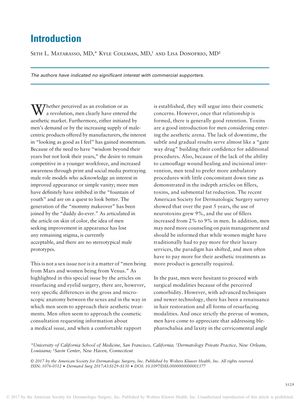Introduction
October 2017
in “
Dermatologic Surgery
”

TLDR More men are getting cosmetic treatments to look young and stay competitive at work.
The document from 2017 discusses the growing interest among men in aesthetic treatments and the shift in societal attitudes towards male cosmetic procedures. It highlights that men are seeking to look as youthful as they feel, driven by a desire to remain competitive in the workforce and influenced by media portrayals of male role models who take pride in their appearance. The article notes specific differences in how men approach cosmetic consultations and treatments, with a preference for non-invasive procedures like neurotoxins and fillers due to minimal downtime. Over the past five years, there has been a 9% increase in the use of neurotoxins and a rise from 2% to 9% in the use of fillers among men. Men may require more counseling on pain management and often pay more for treatments as they typically need more product. Advances in technology have reduced the comorbidity associated with surgical procedures, leading to a renaissance in hair restoration and resurfacing modalities for men. The document also acknowledges the support of Allergan and Merz for the journal issue dedicated to male aesthetics, expressing gratitude for the opportunity to cover this topic comprehensively.




